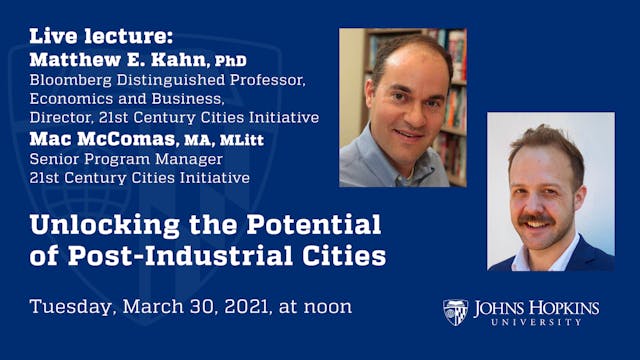Biomedical Challenges of a Trip to Mars
Science, Engineering, & Technology
•
1h 1m
Several agencies are planning to send humans to Mars in the next 10-20 years. Although humans have been venturing into space for almost 60 years, a Mars mission presents new and unprecedented challenges. Join Mark Shelhamer ScD, Associate Professor of Otolaryngology at the Johns Hopkins School of Medicine, as he discusses NASA’s approach to these problems and its limitations. Explore new ways of thinking about human resilience that will be required for a journey to Mars. Learn more about upcoming live lectures at https://www.jhu.edu/hopkinsathome/.
Up Next in Science, Engineering, & Technology
-
Unlocking the Potential of Post-Indus...
In their new book, Unlocking the Potential of Post-Industrial Cities, authors Matthew E. Kahn, Bloomberg Distinguished Professor of Economics and Business and Director of the 21st Century Cities Initiative (21CC) at Johns Hopkins, and Mac McComas, senior program manager at 21CC, explore the recen...
-
The Open Source Software Revolution
Open source software has become a key driver of economic activity, community engagement, and societal impact. Consider that many of the tools used to analyze and trace Covid-19 are open source. The open source programs office (OSPO) has become a widely used construct in the private sector for man...
-
The Hidden Lives of Environmental Mic...
Did you know that the second largest source of biomass on the planet after plants is microorganisms? Too small to be seen with the naked eye, microorganisms and their unique capabilities make them a critical component of how ecosystems function. DNA sequencing, the technology that allowed us to s...



